

TRIGGER WARNING: This story mentions suicidal ideation. Reader discretion is advised.
Neither Bryan Ng nor his parents expected him to make it to a top secondary school.
There, the “happy-go-lucky” boy was bewildered by how driven his peers were to excel in everything they did.

Bryan at the start of secondary school, before his descent into darkness. All photos courtesy of Bryan Ng unless otherwise stated.
“I guess I did not see any point in chasing after grades,” Bryan, now 21 and an undergraduate, told Stories of Hope.
Year after year, he was told by well-meaning adults that he was not studying hard enough.
The student athlete also had co-curricular training on most days after school and could only start doing his homework at 11pm. He regularly went to bed in the wee hours of the morning.
“I saw myself as a massive failure who should never have been born.”
He would wake up feeling poorly rested on most days. He didn’t know it then, but he had sleep apnea, a condition that disrupts the quality of sleep.
He would feel sleepy during the day and struggle to stay awake during class. It added to his perception of himself as “lazy”.
After one parent-teacher meeting in Secondary 2, Bryan walked away with one thought: “Everyone is doing their part except me.”
He felt the weight of his failure – as a son, as a student.
During a six-month boarding programme in Secondary 3, Bryan was plagued by thoughts about jumping down at school after his exams.
The suicidal thoughts would return in waves over the next six years.
“I saw myself as a massive failure who should never have been born. I also wanted to escape from my life of burdens and responsibilities,” he said.
To escape his negative thoughts and low moods, Bryan exercised intensively.
He also spent most of his time with friends, but often felt lonely in his struggle. His negative thoughts returned when he was alone at night.

Bryan (right of photographer) felt genuinely happy when he was with his friends from secondary school.
“I did not share my struggles with my friends as I thought they could neither understand nor help me.
“I also prided myself on being the guy who brought happiness to the group. So I felt that I could not bring sadness to my friends by sharing my pain.
“I was the guy who brought happiness to the group. So I could not bring sadness by sharing my pain.”
“I also did not share much with my parents as we rarely talked about our feelings.”
His feelings of loneliness intensified during the COVID lockdown in 2020 when he was physically separated from his friends.
One night, desperate to pour out his emotions to someone, Bryan typed an email to the Samaritans of Singapore (SOS) 24-hour helpline for persons in crisis or affected by suicide.
“I knew that sending a literal SOS at 2am wasn’t going to solve my problems. It was perhaps a desperate cry from within me for someone to hear what I was going through.”
Bryan did not wait for the response, but he made it through the night – with another wet pillow.
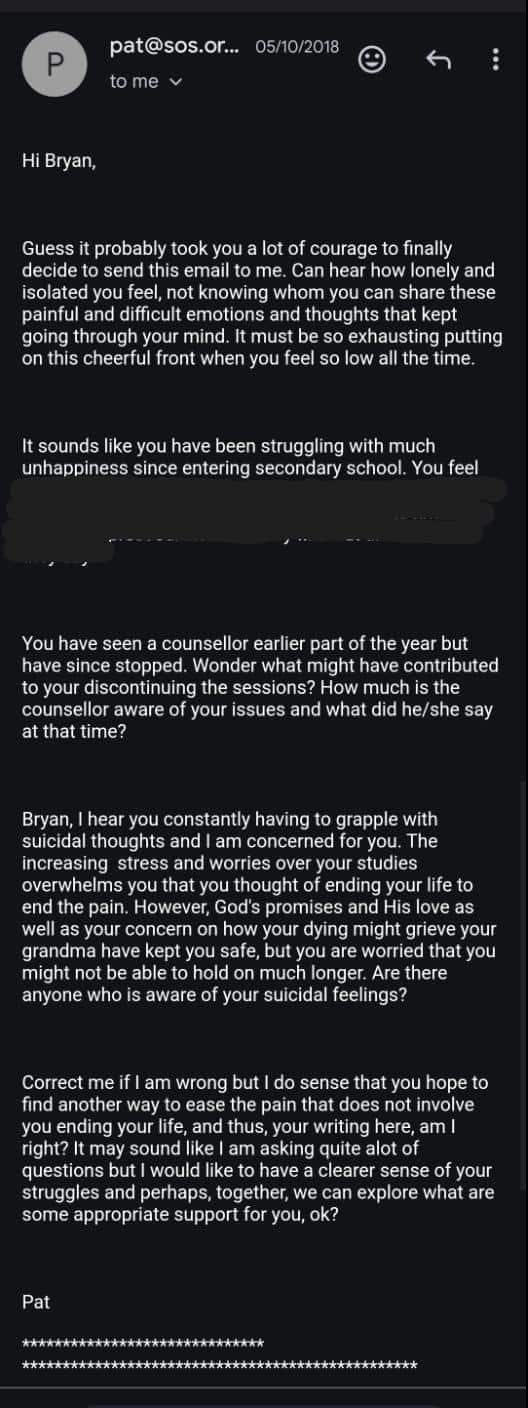
Screenshot of the reply from SOS. “Just typing out my feelings and knowing that someone would read it helped me get through that night,” said Bryan.
Bryan never acted on his suicidal thoughts as he believed it was a sin according to his Christian faith. He was fearful of “going to hell”.
At the same time, he did not want to hurt his loved ones.
He wrestled deeply against his thoughts of death.
“The struggle was exhausting and painful,” he said.
The emotional pain he suffered was magnified by his seemingly smooth life.
“Typing prayers on my mobile phone kept me alive.”
Bryan was known to most as an obedient and filial son, a faithful Christian, and a student athlete in an elite school. He was funny and well-liked by his peers.
Bryan felt like he had “no right to be depressed”. He expected invalidating responses if he were to share his suicidal thoughts.
The only thing Bryan could do was to cry out to God.
“Typing prayers on my mobile phone kept me alive.
“I would ask God to help me get through days where I had only two to three hours of sleep, to help me stop beating myself up, and to help me trust that He was there amidst my pain.”
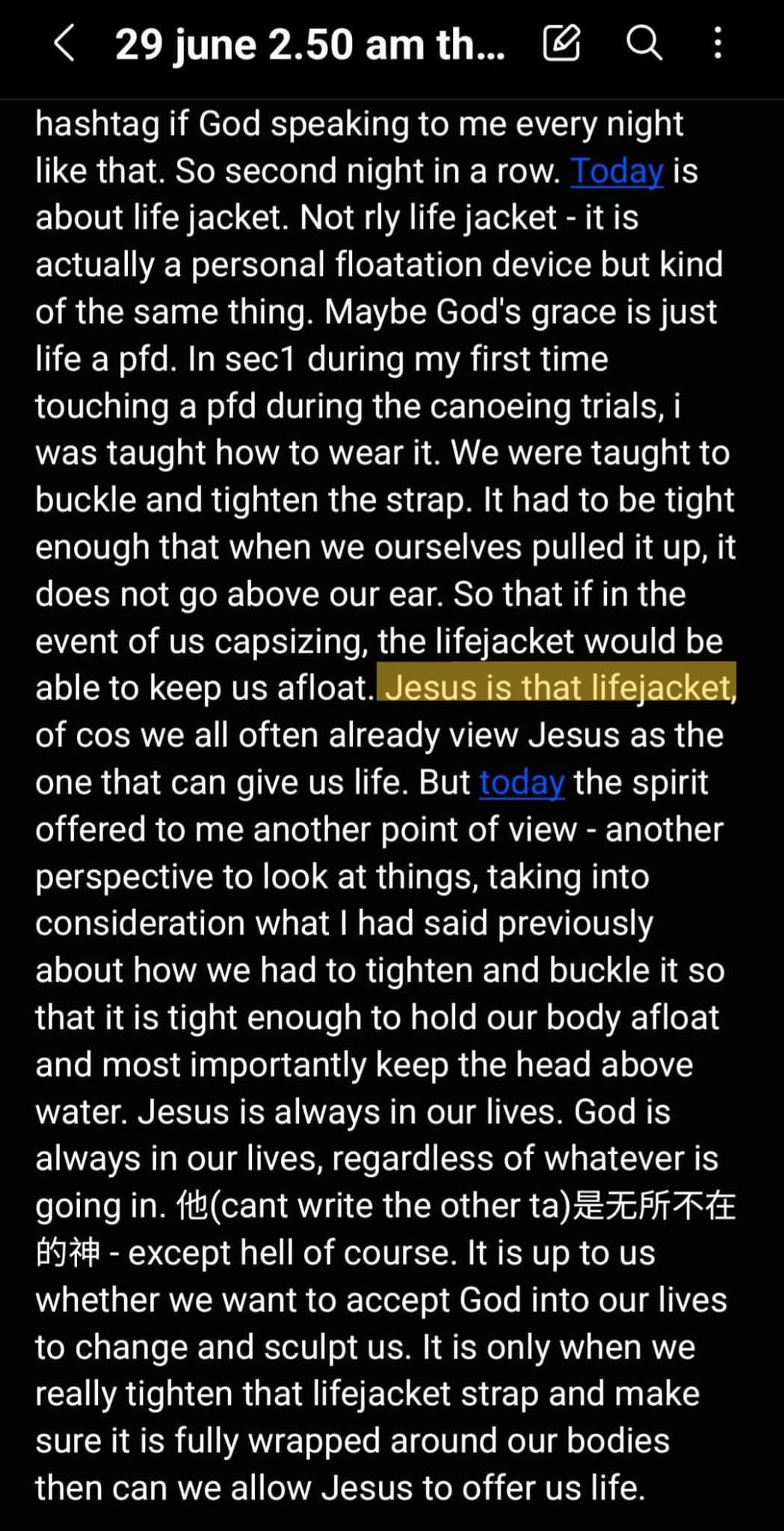
“Jesus is my life-jacket” reads the journal entry of the former canoeist. It was Bryan’s way of communicating with God.
“Bible verses like 1 Samuel 11:9 gave me hope that God would rescue me from my darkness.
“Even though I felt that I had failed God, I was somehow still praying to Him.”
In the new environment of National Service (NS), Bryan was mentally and physically exhausted daily. His thoughts of suicide resurfaced.
“I questioned why I had to wake up every day to this never-ending torture cycle. The question was like a thorn in my mind. I remember that sweaty bunk where I would fight the urges to die daily,” he recalled.

Moments of joy with friends did not stop Bryan’s internal struggle. “I did not want to bring pain to my loved ones. Yet, what about my pain of existing meaninglessly?” he asked.
Bryan continued to turn to God for comfort, believing that God saw his suffering.
He also gathered fellow Christian NS men to pray together.
He experienced a slight upturn in his mental health during the start of Officer Cadet School (OCS) – probably due to experiencing less stress.
However, this was soon followed by a plunge “into the worst period” of his life.
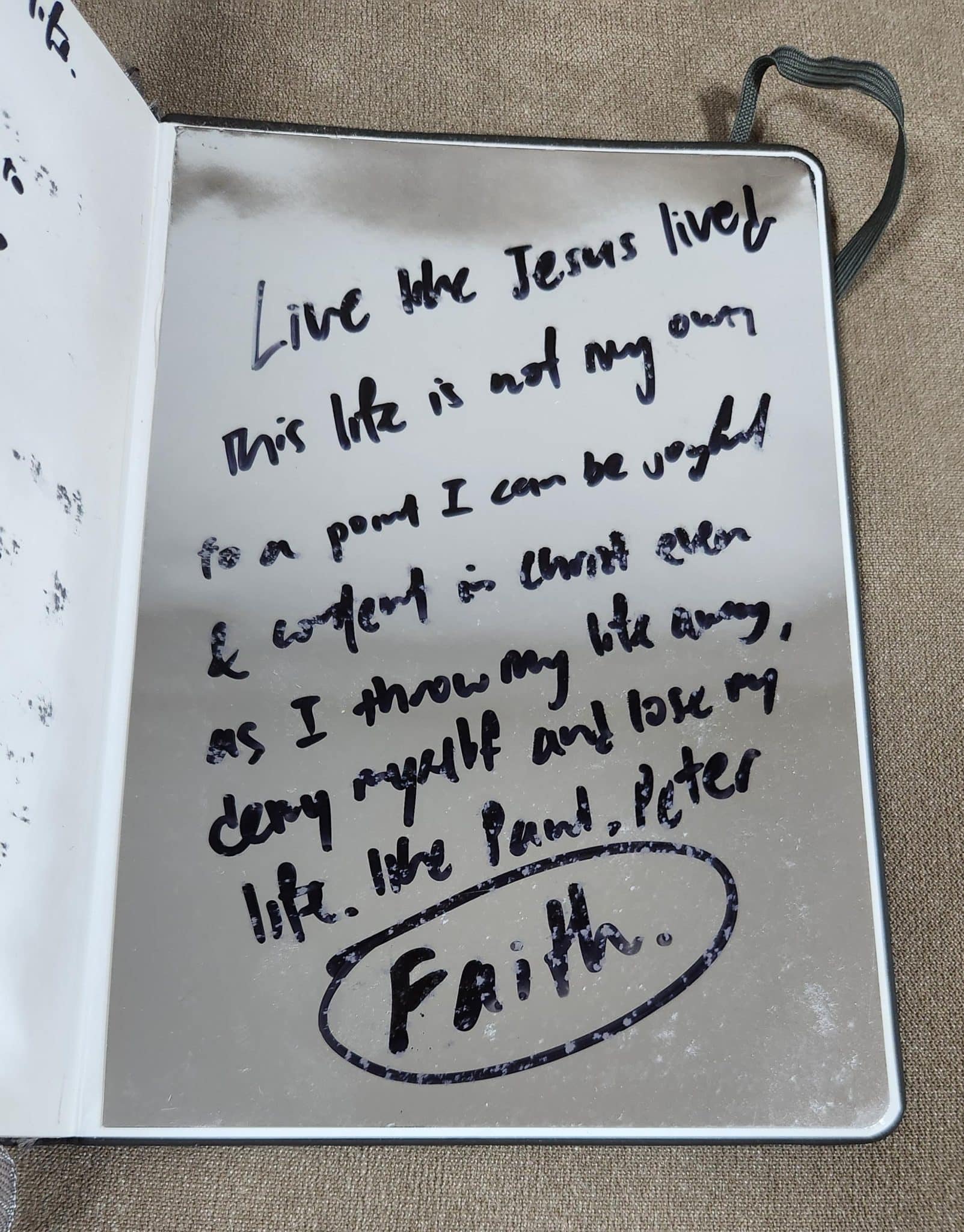
Bryan’s journal entry from church camp in 2022.
“One night, I broke out in hives. The very next day, I experienced sudden chest pains and breathlessness – far more intense than anything I have experienced,” he said.
The breathlessness was so bad that Bryan was hospitalised a few times.
“I could not look at high rise buildings; I had to draw the curtains in my room.”
He saw multiple specialists and was initially diagnosed as having asthma.
In hindsight however, Bryan realised that he was having panic attacks.
“During that period, my suicidal thoughts were so intrusive I could not look at high rise buildings; I had to draw the curtains in my room.
“This in turn made me anxious. Would I eventually act on my urge to end my life? Was my life doomed to this? Was there nothing I could do about it?
“The anxious thoughts were followed by prolonged periods of low moods.”
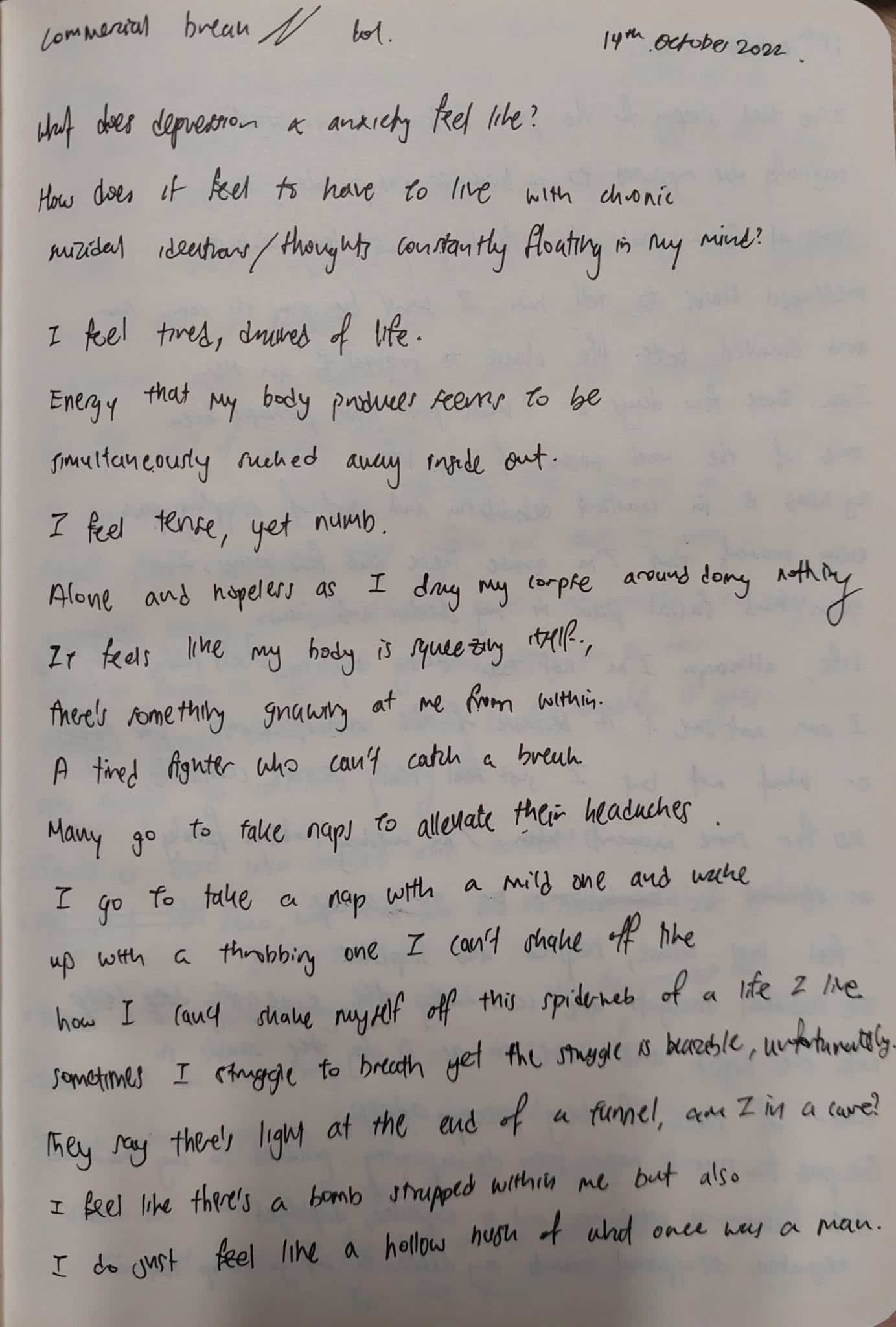
In a raw poem written at the height of his mental health struggles, Bryan described his experience of depression and anxiety.
Sensing that something was very wrong, Bryan considered seeking professional help for his mental health and dropping out of OCS.
However, well-meaning people erroneously discouraged him and voiced their concerns about the potential side effects of psychiatric medications.
He was instead advised to grit himself to complete OCS.
At the height of his struggles, Bryan found himself angry at God. For the first time in his life, he doubted his faith.
“My experience of pain and observation of suffering around the world made me question why a good and loving God would create us human beings, knowing that we would suffer so much – and many would eventually go to hell,” he said.
This crisis of faith sparked a hunger for answers to his questions.
Another trigger was Bryan’s grandmother’s rejection of Christianity despite his attempts to tell her about Jesus’ love.
He could not come to terms with the knowledge that he would one day be forever separated from his beloved grandma if she rejected Jesus’ offer of eternal life.
“I also struggled with the concept of sin and judgment. How can I love God genuinely if my faith is motivated by a desire to avoid punishment?”
With his faith – the main pillar of his psychological support – crumbling, Bryan’s fear and sense of hopelessness intensified.
Yet at the same time, this crisis of faith sparked a hunger for answers to his questions.
His life depended on it.
Unable to bear his pain longer, Bryan confided in a friend who had been open about his own mental health struggles.
The friend encouraged him to seek professional help.

Bryan’s friend (back) booked an appointment for him to see a psychologist.
Bryan felt surprisingly at ease during his first appointment with the psychologist.
“It was like entering into a judgment-free room and getting much off my chest,” he said.
“Seeing the psychologist was like entering into a judgment-free room and getting much off my chest.”
The psychologist referred Bryan to a psychiatrist.
This was the start of his healing journey.
Bryan was diagnosed with dysthymia – a chronic mood disorder characterised by persistent feelings of sadness and hopelessness – as well as anxiety.
He was given two months of medical leave from NS and prescribed medications for his mood and anxiety.
Separately, Bryan also discovered that his struggle to stay awake was a symptom of sleep apnea – a condition where his breathing stops and starts repeatedly during sleep – and underwent surgery to treat it.
Bryan found that talking to the psychologist helped.
“It was a way to release my pain and to be understood.
“The psychologist gave me the words to make sense of my thoughts and feelings and taught me useful handles to contend with my cynical thoughts,” said Bryan.
Bryan learnt to accept his difficult feelings and thoughts without having to engage with them constantly.
He also learnt that he had a negativity bias, meaning he could point out problems in every given situation – which contributed to his cynicism toward life.
From these sessions, Bryan learnt to view his mental struggles as “a tug-of-war with a monster”.
The analogy helped him to recognise that his continued struggle with his thoughts and questions about life was an impasse that only brought him unnecessary exhaustion and pain.
Gradually, Bryan learnt to accept his difficult feelings and thoughts without having to engage with them constantly. Instead, he spent 30 minutes a day journalling and evaluating his negative thoughts.
He spent 30 minutes a day journalling and evaluating his negative thoughts.
Meanwhile, the psychiatrist’s diagnosis helped Bryan and his parents better understand the reason behind his struggles with low moods and chest pains, and the need for medication.
He had been warned that the medications may initially worsen his low moods, mood swings, sleep difficulties and appetite.
But as he pushed through with the doctor’s encouragement, his mood stabilised. His medications were slowly tapered off.
Bryan went back to NS in 2023. On the doctor’s recommendation, he was placed in a department where he could contribute meaningfully with little stress. It helped with his recovery.
During his medical leave and final few months in NS, Bryan had time and space to dive into books, videos and courses on philosophy, theology and Christian counselling.
He sought out a counsellor from Singapore Bible College (SBC) to help sort out his tensions about the faith. He also confided in his church group and leaders.
“I pray that this God who is so, so real to me, will one day be to you as well.”
Bryan was tempted to leave church as he struggled with cynicism about the faith. But he stayed on when this leader gently told him: “I encourage you to keep on coming. I pray that this God who is so, so real to me, will one day be to you as well.”
During his journey of seeking, Bryan found a quote from philosopher Soren Kierkegaard: “… the crucial thing is to find a truth which is truth for me, to find the idea for which I am willing to live and die”.
The quote encouraged Bryan to continue seeking answers to his questions about life and God. It also assured him that he did not need all the answers in order to have faith.
“Looking back, the professional help, community, philosophy and theology were all channels of God’s truth to me,” Bryan said.
In May 2023, Bryan reluctantly joined his small group members in queueing up for prayer at a church conference.
He was sceptical about the effectiveness of such prayer sessions.
“If my friends had not accompanied me to the room, I would have just left when I saw the queue,” he said.
“They were like the four friends who were so determined to help their paralysed friend (me) seek healing, they lowered him through the roof in order to reach Jesus in a crowded room,” said Bryan, referring to the story in Mark 2:3-11.

“It was the first time I understood the power of community,” said Bryan (front), of members from his previous small group, whose actions helped him turn a corner.
“The prayer minister told me that as I was walking toward her, she could feel that God has never left me nor stopped loving me and has been continuously sending angels to protect me. She prayed for God to breathe new life into my heart of stone and to experience God’s love beyond intellect,” recalled Bryan, reading from his journal.
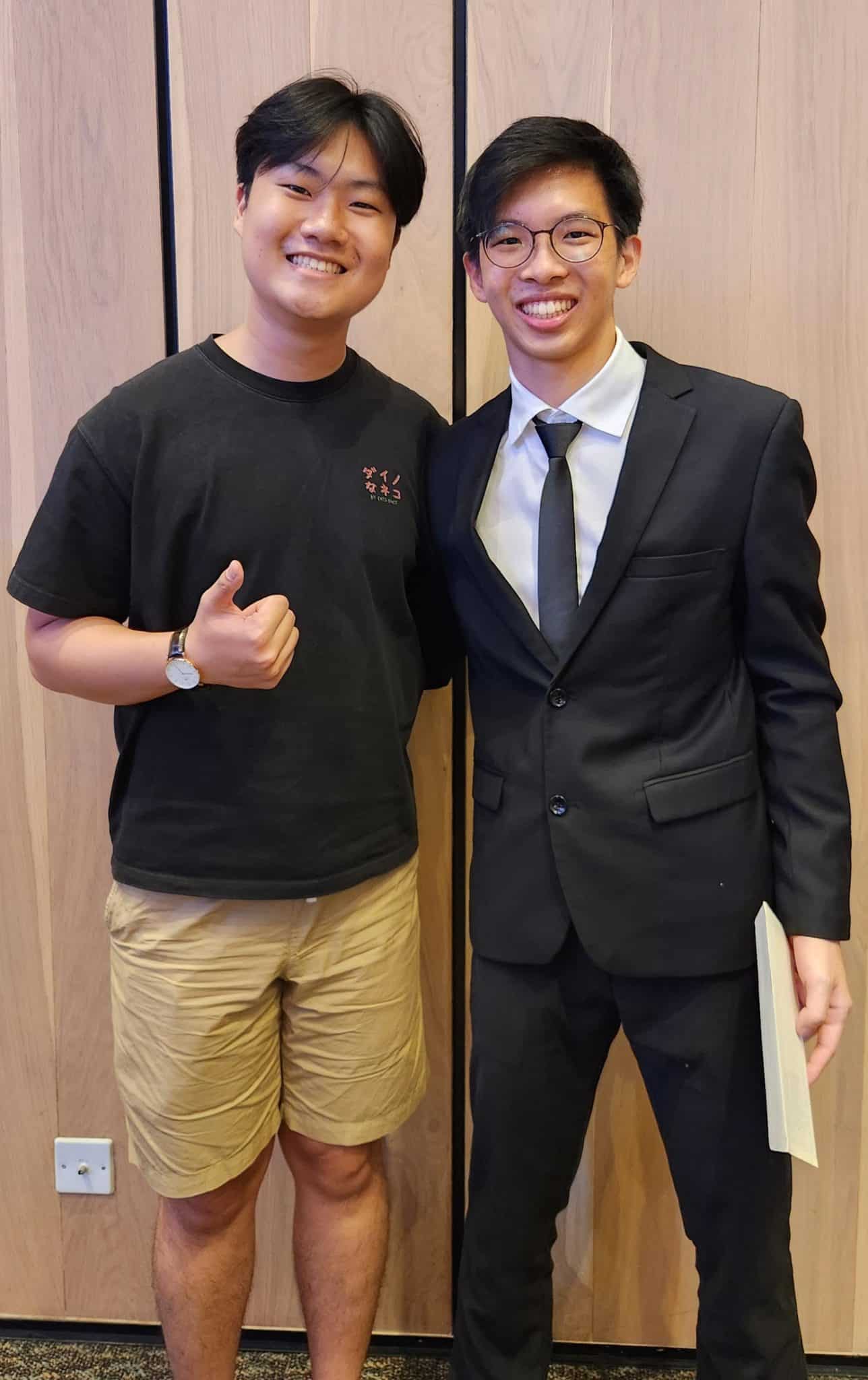
Bryan’s church leader (left) encouraged Bryan to write down the words of the prayer minister.
“I was so moved. This was the first time I really understood God’s feelings as a father, towards me.”
The next and final turning point came during a church camp later that year while Bryan was worshipping God – and felt the magnitude of God’s love for him.
“I was reminded of the prayer I made one year ago at the same church camp – for God to give me faith at whatever cost.”
“This was when I understood how much God loves me.”
“I did not make the connection while I was struggling but I then realised that God had indeed answered my prayer.
“He brought me through a journey – of trials, sufferings and doubt, where everything I thought I knew and believed in was put to the test in order that my faith may be stronger than ever.
“In this process, God was willing to ache with me, cry with me through my pain and even willing for me to doubt and be angry at Him.
“This was when I understood how much He loves me.”
During a course at Bible school in 2024, discussions with like-minded peers and teachers helped Bryan understand that pain is a result of the broken state of people and society.

Bryan (centre) with his small group at Tung Ling Bible School.
Bryan said: “Going through sorrow and doubt did not make me stronger – I could have emerged more bitter and angry.
“But as I sought God amidst it all, I saw how God allowed suffering to grow my character, strengthen my faith, and reveal his goodness to me and others around me,” said Bryan.
“I believe God responded to my hunger to seek Him,” said Bryan, who pointed to the Christian worship song “The More I Seek You” by Kari Jobe.
“While not all my questions were answered intellectually, I saw how everything in my life was consistent with what it says in the Bible and I could therefore put my faith in Jesus and live my life based on this faith.
“I now believe God is who He says He is and has done what He said He has done in the Bible.

“I do what I do – study hard, serve in church, care for others – out of my eternal gratitude and love for God,” says Bryan (centre, back row) with his current small group in church.
One year on from recovery, Bryan encourages peers who struggle with mental health to seek help from professionals and, if they are Christians, pastoral counsel: “Seeking help is a form of taking a stand against the disorder. It is a way of saying ‘I will fight for my own mental health.’

Bryan, holding his dog, which he got during his recovery. “He did really help me in my healing journey.”
“And pray.
“Let God be the receiver of your questions and complaints. Be vulnerable and honest – God isn’t afraid of our ‘difficult’ questions. Bring yourself to channels of His voice – seek out His Word in the Bible and His people who can encourage you.”
If you are in a crisis, contact Samaritans of Singapore via:
24-hour Hotline: 1767
24-hour CareText: 9151 1767 (via WhatsApp)
Call 999 if there is a risk of injury, immediate threat to life or bodily harm (relatives and friends of victims can call as well).
If you would like to know more about Jesus, click here to find a church near you.
Click here to join our Telegram family for more stories like Bryan’s.
RELATED STORIES:
Feeling the greatest shame, this NS boy’s life changed after one supernatural moment
I was drowning in depression when I found an anchor for my life
My bipolar disorder came out of the blue, but I feel better after 5 years










